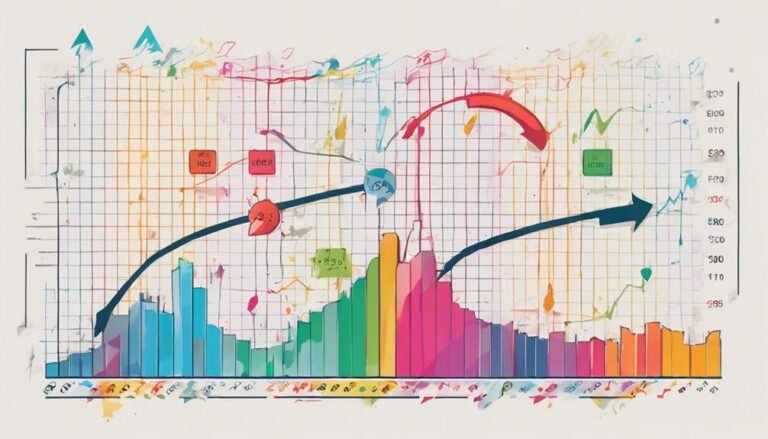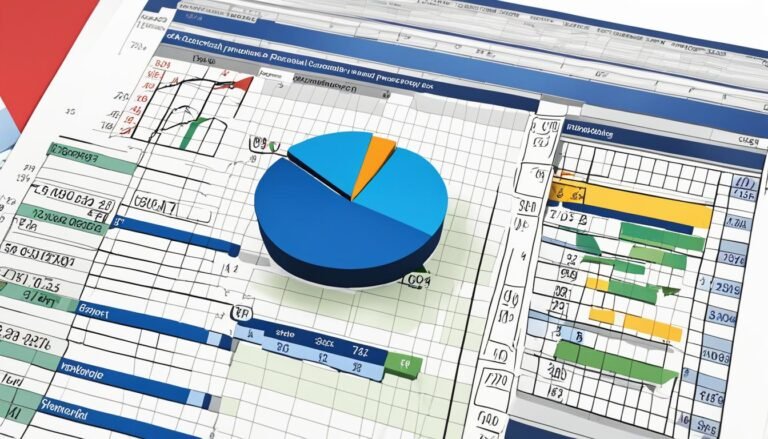Revolutionizing Money – Blockchain in Finance
Blockchain technology is changing the game in the financial services industry. With its secure, decentralized, and transparent ledger system, blockchain has the potential to revolutionize traditional business models and practices. By leveraging blockchain technology, financial institutions can achieve improved efficiency, reduced costs, and enhanced security in their transactions.
Blockchain in finance brings forth a new era of secure transactions and transparency. It eliminates the need for intermediaries, ensuring that transactions are conducted directly between participants. This not only speeds up the process but also minimizes the risk of fraud and tampering.
Moreover, blockchain technology has the ability to transform payment systems. By utilizing blockchain-based payment systems, cross-border transactions become faster, more secure, and more affordable. One notable example is Ripple, a global payment network built on blockchain technology that enables financial institutions to process payments in real-time with minimal fees.
The impact of blockchain technology extends beyond payment systems. It has the potential to enhance trade finance by digitizing trade documents, streamlining processes, and providing a secure environment for transactions. Blockchain-based platforms like Marco Polo offer faster, more transparent, and secure trade finance solutions.
Tokenization and smart contracts are also reshaping the asset management industry. Blockchain enables the conversion of real-world assets into digital tokens, improving liquidity and fractional ownership. Smart contracts automate processes such as trade clearing and settlement, reducing costs and operational risks.
Insurance, too, can benefit from blockchain technology. With its ability to streamline claims processing, enhance transparency, and reduce fraud, blockchain has the potential to revolutionize the insurance industry. Storing policy and claims data on a blockchain allows for faster payouts and reduced administrative costs.
Regulatory compliance is another area where blockchain can make a significant impact. Blockchain technology provides secure and tamper-proof record-keeping, simplifying compliance procedures and ensuring accurate transaction monitoring and auditing. Its use in identity management solutions can facilitate efficient customer onboarding and anti-money laundering.
By expanding access to financial services, blockchain technology promotes financial inclusion. Decentralized finance platforms built on blockchain technology offer cost-effective solutions, bridging the gap between the banked and unbanked populations. This has the potential to drive economic development and empower individuals.
In conclusion, blockchain technology is set to transform the financial industry. With its potential to increase transparency, security, and efficiency, blockchain has the power to revolutionize traditional business models and processes. As the adoption of blockchain continues to grow, the future of finance looks promising.
Key Takeaways:
- Blockchain technology revolutionizes the financial services industry by providing secure, decentralized, and transparent transactions.
- It enhances payment systems, trade finance, asset management, insurance, regulatory compliance, and financial inclusion.
- Ripple is a notable example of a blockchain-based payment system that enables faster and more cost-effective cross-border transactions.
- Tokenization and smart contracts reshape asset management, improving liquidity, fractional ownership, and efficiency.
- Blockchain technology streamlines claims processing, enhances transparency, and reduces fraud in the insurance industry.
Streamlining Payment Systems
Blockchain technology has revolutionized payment systems by introducing blockchain-based payment systems, enabling faster, more secure, and cost-effective cross-border transactions. By eliminating intermediaries, blockchain technology streamlines the payment process, making it more efficient and transparent.
One notable example of a blockchain-based payment system is Ripple. Ripple operates a global payment network that leverages blockchain technology to facilitate instant, low-cost cross-border transactions. Financial institutions using Ripple’s network can process payments in real-time, reducing settlement times and minimizing fees.
Ripple’s global payment network operates on the XRP Ledger, a blockchain that enables fast and secure transactions. Through RippleNet, Ripple’s network of financial institutions, users can access a global liquidity pool, ensuring that cross-border transactions are executed efficiently and cost-effectively.
The advantages of using blockchain-based payment systems like Ripple are numerous. These systems provide enhanced security by using cryptography to ensure the integrity and privacy of transactions. Additionally, blockchain technology enables greater transparency, as all transaction information is recorded on an immutable ledger accessible to all network participants.
Moreover, blockchain-based payment systems have the potential to greatly reduce the time and cost associated with cross-border transactions. Traditional payment systems often involve multiple intermediaries, leading to delays and high transaction fees. By eliminating these intermediaries, blockchain-based payment systems offer a direct and efficient method of transferring value across borders.
“Blockchain-based payment systems have the potential to revolutionize cross-border transactions, providing faster, more secure, and cost-effective solutions for individuals and businesses alike.”
Benefits of Blockchain-based Payment Systems:
- Fast and efficient cross-border transactions
- Enhanced security through cryptography
- Greater transparency and traceability
- Reduced costs by eliminating intermediaries
- Improved liquidity and access to global markets
Blockchain-based payment systems, like Ripple, have already gained traction in the financial industry, with numerous financial institutions adopting these technologies to streamline their operations. As the global payment landscape continues to evolve, blockchain-based payment systems are expected to play a prominent role in revolutionizing cross-border transactions.
Enhancing Trade Finance
Blockchain technology has the potential to revolutionize trade finance by digitizing trade documents, streamlining processes, and providing a secure environment for transactions. With the advent of blockchain-based platforms like Marco Polo, trade finance solutions have become faster, more transparent, and more secure than ever before.
By leveraging blockchain technology, trade finance platforms such as Marco Polo offer a range of benefits to trading partners. These platforms enable the digitization of trade documents, eliminating the need for paper-based processes and reducing the risk of document fraud or loss.
Additionally, blockchain-based platforms enhance transparency in trade finance by providing a shared, immutable ledger that all parties can access. This increased transparency promotes trust among trading partners, enabling them to collaborate more effectively and make better-informed decisions.
Furthermore, the adoption of blockchain in trade finance streamlines processes by automating certain tasks and reducing the need for intermediaries. This not only improves efficiency but also reduces costs associated with manual processing and paperwork.
A prime example of a blockchain-based trade finance platform is Marco Polo, which utilizes the power of blockchain technology to offer secure and efficient trade financing solutions. Marco Polo provides a network where banks, other financial institutions, and corporates can collaborate in real time, accelerating trade finance processes and fostering increased collaboration.
With blockchain-based platforms like Marco Polo, trade finance becomes more accessible, efficient, and transparent. It eliminates many of the complexities and inefficiencies of traditional trade finance practices, revolutionizing the way international trade is conducted.
Table:
| Benefits of Blockchain in Trade Finance |
|---|
|
Transforming Asset Management
The asset management industry is experiencing a transformative shift with the adoption of blockchain technology. Two significant applications, smart contracts and tokenization, are revolutionizing how assets are managed and investments are made.
The Power of Smart Contracts
Smart contracts, powered by blockchain technology, have the potential to automate and streamline asset management processes. These self-executing contracts operate based on predefined conditions, enabling trade clearing and settlement with minimal human intervention. By removing intermediaries and reducing reliance on manual processes, smart contracts not only increase efficiency but also reduce operational costs and risks associated with human error and fraud.
Imagine a system where trade settlements occur instantly, removing the need for lengthy paperwork and reducing the risk of settlement failures. By leveraging smart contracts, asset managers can transform their operations, improve transaction speed, and enhance client experiences.
Tokenization: Unlocking Liquidity and Access
Tokenization is another game-changing aspect of blockchain technology in asset management. Through tokenization, real-world assets, such as real estate, works of art, or private equity, can be converted into digital tokens. These tokens represent fractional ownership of the underlying assets, enabling investors to diversify their portfolios and gain access to previously illiquid investments.
Tokenization opens doors to new investment opportunities for a broader base of investors. Fractional ownership allows individuals to invest in high-value assets that were previously exclusive to institutional investors or high-net-worth individuals. This democratization of access promotes inclusivity and fosters transparency in the investment process.
Driving Transparency and Investor Participation
Blockchain-powered asset management solutions offer unprecedented transparency to investors. Transactions recorded on a blockchain are immutable and timestamped, providing a transparent audit trail. Investors can verify the authenticity of transactions and track the progress of their investments in real-time. This transparency builds trust and confidence, which is crucial for attracting and retaining investors in the asset management industry.
Furthermore, the use of blockchain technology in asset management allows for direct investor participation. Tokenization and smart contracts enable peer-to-peer transfers of assets, reducing the need for intermediaries and associated fees. Investors have more control and are actively involved in the investment process, leading to a more inclusive and collaborative ecosystem.
Revolutionizing Insurance
Blockchain technology has the potential to revolutionize the insurance industry by transforming claims processing, enhancing transparency, and reducing fraud. By leveraging the power of smart contracts and storing policy and claims data on a blockchain, insurers can streamline the claims process, leading to faster payouts and reduced administrative costs.
With the integration of smart contracts, claims processing can be automated, eliminating the need for manual handling and paperwork. This automation ensures that claims are processed accurately and efficiently, saving time for both insurers and policyholders.
The use of blockchain technology also promotes transparency in insurance. By storing policy and claims data in a decentralized and immutable ledger, insurers can provide a clear and auditable record of transactions. This transparency builds trust and allows stakeholders to verify the accuracy of claims and policy information.
Furthermore, blockchain enables better risk assessment and pricing in insurance. Insurers can access verifiable data from the blockchain to assess risk more accurately, leading to fairer premiums and improved risk management. This data-driven approach enhances underwriting techniques and improves overall decision-making processes.
| Benefits of Blockchain in Insurance |
|---|
| Streamlined claims processing |
| Enhanced transparency and trust |
| Reduced administrative costs |
| Improved risk assessment and pricing |
“Blockchain technology has the potential to reshape the insurance industry by streamlining claims processing, enhancing transparency, and improving risk management. By adopting blockchain solutions, insurers can create more customer-centric and efficient processes, benefiting both the industry and policyholders.”
Adoption of blockchain technology in insurance can drive a customer-centric approach, leading to faster claims resolution, reduced paperwork, and improved customer satisfaction. Policyholders can experience a higher level of trust and confidence in the insurance industry knowing that their claims are being processed efficiently and transparently.
In conclusion, the integration of blockchain technology in the insurance industry has the potential to revolutionize the way claims are processed, promoting transparency, reducing fraud, and enhancing risk assessment. By leveraging the benefits of smart contracts and a decentralized ledger system, insurers can provide faster, more efficient, and customer-centric insurance processes. The adoption of blockchain technology in insurance holds great promise for the future, transforming an industry that has historically been plagued by administrative complexities and lack of trust.
Modernizing Regulatory Compliance
Blockchain technology has the potential to modernize regulatory compliance in the financial services industry, revolutionizing the way compliance procedures are conducted and creating new possibilities for secure record-keeping and identity management solutions.
By leveraging blockchain, financial institutions can ensure secure, transparent, and tamper-proof record-keeping, which is crucial for regulatory compliance. The decentralized nature of blockchain ensures that data is stored across multiple nodes, making it resistant to alteration or manipulation. This guarantees the integrity of financial records, facilitating accurate transaction monitoring and auditing processes.
Furthermore, blockchain simplifies compliance procedures by automating manual tasks and providing real-time access to transaction data. Financial institutions can utilize smart contracts, self-executing contracts with the terms of the agreement directly written into code, to ensure compliance with regulations and automate the enforcement of contractual obligations. This not only reduces the risk of human error but also enables efficient and effective compliance management.
Additionally, blockchain-based identity management solutions can play a vital role in regulatory compliance. With blockchain, customer onboarding processes can be streamlined through the secure verification and sharing of customer data. This improves the efficiency of customer due diligence procedures and simplifies anti-money laundering (AML) processes.
Blockchain technology has the potential to alleviate regulatory burdens, foster innovation, and promote growth in the financial services industry.
To illustrate the potential benefits of blockchain in regulatory compliance, consider the following example:
| Traditional Compliance Process | Blockchain-Enabled Compliance Process |
|---|---|
| Manual data entry and processing | Automatic data validation and verification |
| Centralized record-keeping | Decentralized, tamper-proof record-keeping |
| Time-consuming and error-prone audits | Real-time, transparent auditing |
| Fragmented identity verification | Streamlined and secure identity management |
As demonstrated in the table above, blockchain technology offers significant advantages over traditional compliance processes. It enhances efficiency, accuracy, and transparency, enabling financial institutions to meet regulatory requirements more effectively.
In conclusion, blockchain technology presents exciting opportunities for modernizing regulatory compliance in the financial services industry. By embracing blockchain solutions, financial institutions can streamline compliance procedures, ensure secure record-keeping, and enhance identity management. These advancements have the potential to alleviate regulatory burdens, foster innovation, and promote sustainable growth in the industry.
Promoting Financial Inclusion
Blockchain technology has emerged as a powerful tool for promoting financial inclusion, addressing the challenge of limited access to financial services faced by unbanked and underbanked populations. By leveraging decentralized finance (DeFi) platforms built on blockchain technology, individuals can now have greater accessibility to a range of financial services without relying on traditional intermediaries like banks. These innovative platforms are bridging the gap by offering cost-effective solutions and lowering barriers to entry, ultimately driving economic development and empowering underserved communities.
Expanding Access to Financial Services
Decentralized finance platforms enable individuals to access financial services such as lending, borrowing, savings, and investment opportunities directly from their digital wallets, without the need for a traditional bank account. This provides a significant advantage for the unbanked and underbanked populations, who often face challenges in meeting the requirements set by traditional financial institutions.
“Blockchain-powered DeFi platforms democratize access to financial services, allowing individuals from all walks of life to participate in the global economy.”
Lowering Barriers to Entry
One of the key advantages of blockchain-based financial services is the reduced entry barriers for users. Unlike traditional financial institutions that may impose high minimum investment thresholds or require extensive documentation, DeFi platforms often offer lower entry requirements, making it more accessible for individuals with limited resources to participate in financial activities.
Driving Economic Development
The promotion of financial inclusion through blockchain technology has the potential to drive economic development in underserved areas. By leveraging blockchain-based financial services, individuals can secure loans, access savings and investment options, and engage in economic activities that were previously out of reach. This increased access to financial resources empowers individuals to start or expand businesses, invest in education and healthcare, and improve their overall financial well-being.
| Benefits of Blockchain for Financial Inclusion | Challenges |
|---|---|
|
|
How Blockchain Technology Addresses Industry Challenges
Blockchain technology offers effective solutions to major challenges present in the finance industry. By leveraging its key features, blockchain enhances security, transparency, and efficiency, while significantly reducing costs and enabling instant settlements.
Enhanced Security and Transparency
One of the crucial aspects of blockchain technology is its ability to ensure data immutability and privacy. The decentralized nature of blockchain prevents tampering or unauthorized access, making it highly secure. Additionally, the transparency provided by blockchain allows for a clear audit trail of transactions, promoting trust and accountability.
Cost Reduction through Eliminating Intermediaries
Blockchain technology eliminates the need for intermediaries such as banks or clearinghouses, reducing operational costs significantly. With direct, peer-to-peer transactions facilitated by blockchain, unnecessary fees and delays associated with intermediaries are eliminated, resulting in a more cost-effective process.
Effective Risk Management with Smart Contracts
Smart contracts, automated contracts executed on the blockchain, enable the efficient management of risks. These contracts execute predefined actions based on specified conditions, ensuring adherence to agreed-upon terms and minimization of risk exposure. By automating risk management processes, blockchain technology enhances the overall efficiency and effectiveness of risk management in the finance industry.
Improved Data Management
Blockchain technology provides a more robust and secure framework for data management within the finance industry. The decentralized nature of blockchain allows for efficient data sharing and synchronization among multiple parties, reducing the chances of data breaches or inaccuracies. With improved data integrity and accessibility, financial institutions can make more informed decisions and optimize their operations.
Instant Settlements for Speed and Efficiency
Traditional financial transactions often involve lengthy settlement periods and significant costs. Utilizing blockchain technology allows for instant settlements, where transactions are processed and validated within seconds or minutes. This not only improves the overall speed and efficiency of financial transactions but also reduces associated costs and minimizes the risks of delays or errors.
In today’s fast-paced and evolving financial landscape, blockchain technology offers practical solutions to address industry challenges. From enhanced security and transparency to reduced costs, effective risk management, and instant settlements, blockchain has the potential to transform the finance industry by improving processes and outcomes.
Potential Applications of Blockchain in Financial Services
Blockchain technology has the potential to revolutionize various aspects of financial services. Its decentralized and secure nature makes it a robust solution for enhancing efficiency, transparency, and security in the industry. Let’s explore some potential applications of blockchain in financial services:
Digital Identity Verification
Blockchain can be utilized for digital identity verification, providing a secure and efficient way to verify and authenticate customer identities. By leveraging blockchain’s immutable and tamper-proof ledger, organizations can streamline customer onboarding processes, reduce fraud, and enhance security.
Cross-Border Transactions
One of the significant challenges in cross-border transactions is the complexity and cost involved in settlement and reconciliation. Blockchain technology can facilitate faster, more cost-effective cross-border transactions by eliminating intermediaries and providing a transparent platform for secure peer-to-peer transactions.
Trade Finance Platforms
Blockchain-based trade finance platforms offer numerous benefits to the industry. By digitizing trade documents and utilizing smart contracts, blockchain can streamline trade finance processes, reduce paperwork, enhance transparency, and mitigate fraud. Platforms like Marco Polo have already demonstrated the potential of blockchain in trade finance.
Credit Reporting
Blockchain can significantly improve credit reporting by enhancing security and accuracy. Through decentralized, transparent, and tamper-proof record-keeping, blockchain can enable more reliable credit reporting, allowing financial institutions to make informed lending decisions based on verified and up-to-date information.
Clearing and Settlement
Clearing and settlement processes in traditional financial systems are often time-consuming and prone to errors. Blockchain offers a more efficient and secure alternative by enabling real-time clearing and settlement through smart contracts. By automating these processes, settlement times can be drastically reduced, minimizing risks and improving operational efficiency.
Blockchain technology has the potential to revolutionize the financial services industry by providing secure and efficient solutions for digital identity verification, cross-border transactions, trade finance platforms, credit reporting, and clearing and settlement processes.
With the integration of blockchain into financial services, organizations can enhance security, reduce costs, improve efficiency, and foster trust among stakeholders. By leveraging the power of blockchain, the finance industry can embrace a future of innovation and transformation.
Future Outlook and Potential Developments
In the rapidly evolving landscape of financial technology, the integration of blockchain with emerging technologies holds great promise for the future of finance. As blockchain continues to enhance transparency, security, and efficiency in the industry, the integration with artificial intelligence (AI), Internet of Things (IoT), big data analytics, and cloud computing opens up new possibilities for innovation.
AI Integration in Blockchain
AI algorithms have the ability to analyze vast amounts of data stored on the blockchain, enabling fraud detection, risk assessment, and predictive analytics. By leveraging AI’s capabilities, financial institutions can enhance their decision-making processes, automate complex tasks, and identify patterns that would otherwise be difficult to detect.
Blockchain and IoT
The integration of blockchain with the Internet of Things (IoT) offers exciting opportunities for secure and decentralized peer-to-peer transactions. By utilizing blockchain’s immutable and transparent nature, IoT devices can securely exchange value, authenticate data, and enable new business models. This integration enhances data security, eliminates the need for intermediaries, and facilitates seamless transactions across interconnected devices.
Big Data Analytics and Blockchain
The combination of big data analytics and blockchain technology opens up avenues for advanced data analysis, pattern recognition, and real-time insights. By harnessing the power of big data analytics, financial institutions can gain deeper understanding of customer behavior, market trends, and risk profiles, leading to more informed decision-making and improved business outcomes.
Cloud Computing and Blockchain
Cloud computing provides a scalable and resilient infrastructure for blockchain networks, enabling efficient storage, processing, and retrieval of blockchain data. By leveraging cloud technology, organizations can overcome the challenges of scalability, interoperability, and resource management associated with blockchain implementation. Cloud-based blockchain solutions offer cost-effective and flexible options for organizations looking to adopt blockchain technology.
| Integration | Potential Benefits |
|---|---|
| AI Integration | Improved fraud detection and risk assessment Enhanced decision-making processes Automation of complex tasks |
| Blockchain and IoT | Secure and decentralized peer-to-peer transactions Authentication of IoT device data New business models |
| Big Data Analytics and Blockchain | Advanced data analysis and pattern recognition Real-time insights and informed decision-making Enhanced risk management |
| Cloud Computing and Blockchain | Scalable and resilient blockchain networks Efficient storage, processing, and retrieval of blockchain data Cost-effective and flexible implementation options |
The integration of blockchain with AI, IoT, big data analytics, and cloud computing represents a significant leap forward for the finance industry. As these technologies continue to mature and evolve, we can expect to see further advancements in financial services, leading to improved efficiency, greater security, and enhanced customer experiences.
Conclusion
Blockchain technology is revolutionizing the financial industry by increasing transparency, security, and efficiency. With its decentralized nature and secure ledger system, blockchain has the potential to transform traditional business models and practices, driving financial innovation and inclusivity.
By eliminating intermediaries and providing a tamper-proof record-keeping system, blockchain enhances transparency in financial transactions, reducing the risk of fraud and manipulation. This increased transparency fosters trust among participants, promoting a more inclusive and accessible financial ecosystem.
As blockchain adoption continues to grow and regulatory frameworks evolve, the future of blockchain in finance looks promising. Financial institutions are increasingly exploring the integration of blockchain with emerging technologies such as AI, IoT, and big data analytics. This integration can further enhance the capabilities of blockchain, enabling advanced risk assessment, secure peer-to-peer transactions, and improved data management.
In conclusion, blockchain technology is paving the way for a more innovative, inclusive, and secure financial industry. As businesses and regulators embrace this disruptive technology, we can expect to see continued advancements in financial innovation, increased accessibility to financial services, and a more transparent and efficient future of finance.
Source Links
- https://www.linkedin.com/pulse/blockchain-finance-revolutionizing-industry-kamlesh-shewani
- https://www.forbes.com/sites/forbestechcouncil/2023/06/07/how-blockchain-is-transforming-the-entire-financial-services-industry/?sh=e0f7ca227535
- https://hashstudioz.com/blog/how-blockchain-can-revolutionize-the-financial-sector/







